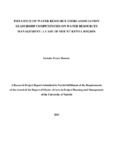| dc.description.abstract | This study took place in Mount Kenya region covering counties of Nyeri, Kirinyaga, Embu and Muranga
in Kenya. The region is of great economic, social and environmental importance to the nation because of
its rich agricultural production, source of water for the city of Nairobi and source of water to Mazinga and
Kaburu dams that generate over 65% of hydro power to the country. The main objective of the study was
to assess the Water Resource Users Association leadership competency in managing water resources
focusing on their strategic leadership skills, interpersonal skills, project management skills and financial
resources management capacity. Out of the targeted 150 WRUA leaders, 137 responded at 91.3%
making the results reliable. The researcher used interviews and questionnaires techniques to collect data
which was analyzed by using SPSS package. The study established that: 1) the WRUA leadership is
comprised of 72.3% men and 27.7% female, 2) 90% of the WRUA leadership is above 40 years of age, 3)
86.1% of the WRUA leadership had the necessary level of school education, training and the necessary
experience for water resources management, 4) 68.6% of the WRUAs are lacking sufficient funds for
their operations, 5) 62% of the WRUA leadership experienced water related conflicts in the past 12
months, 6) majority of WRUA leadership were involved in the implementation of several projects in the
last 12 months, and 7) majority of WRUA leadership have not been trained on key financial management
topics and they lack financial management systems and sufficient financial resources making water
resources management difficult. Based on the findings of this research, it is recommended governments
(National and County) and other stakeholders: establish a sustainable financing mechanism for WRUA
operations and water resources conservation and management, review the mandate of WRUAs to tackle
institutional and operational weaknesses and facilitate the development of WRUA operations manual to
clearly define how WRUAs will operate and achieve their objectives. The study revealed that the Mount
Kenya region WRUAs have succeeded in bringing together community members and different
stakeholders to focus on water resources management. The WRUA leadership had the necessary strategic
leadership skills and project management skills that has influenced water resources management
positively. On the other hand, lack of the necessary interpersonal skills and limited financial resources
management skills has made water resources management difficult. The situation demands technical
support and capacity building of the WRUA leadership to ensure proper management, conservation,
utilization and regulation of water resources in often very innovative ways. This will lead to effective
water resources management, which is crucial for Kenya’s sustainable economic growth and poverty
reduction. | en_US |

